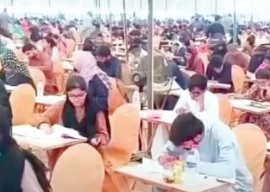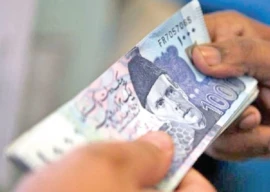
Ghulam Mustafa’s only training is as a cook. But this year’s floods have turned him into a fisherman. He and a teenage son have been catching the ‘jarko’ that have made their way into the standing floodwaters after fish farm boundaries broke in the August rains.
Air bubbles from the fish make their way to the surface of the water in the field outside Jhuddo. Mustafa, who has 11 children to feed, muses: “Hunger has turned me into a fisherman”. He and his son catch about 25 kilogrammes of fish every day, which is then sold in the nearest town of Tando Bhago. They sell for about Rs30 per kg, according to a farmer who has also turned fisherman.
Another hopeful fisherman is Bhanji who has cast his net into the water for the first time. Here too hunger is the motivator but all of these moonlighting fishermen are aware that this catch may not be the healthiest of options since it is breeding in stagnant water. They also come with a tinge of morbidity - the water surrounds two graveyards for Hindus and Muslims.
Fishing is just one of the limited options in this flood-hit district where farming is, until the water recedes, not much of a possibility. People do menial jobs such as transporting water or other goods. Those who cannot find work while away the days in makeshift camps by the sides of the main roads, surviving from handout to handout from non-governmental organisations.
“Someone will come and leave a kilo of wheat, or a kilo of lentils,” says Tikam Das, a middle-aged farm hand who now lives in a makeshift camp on the main Badin road. He stopped studying after the fifth grade.
Even if he has to find another line of work, not much is out there. He does not even have the Rs1,000 needed to register for a new National Identity Card, which would help him apply for the Pakistan Card - a government welfare programme that gives flood-displaced people 10,000 rupees.
In Badin district, people have traditionally made a living by rearing livestock or growing sugarcane, rice, wheat, sunflower, tomatoes and cotton. But with the monsoon rains at the tail end of the summer, these sectors took a battering. In many parts the livestock was killed or fell sick and the fields disappeared under water. Right now a little less than half the district is still struggling in the aftermath.
At the brick kilns on the Jhuddo road, which divides Badin and Mirpurkhas, there is work available. But it is for the labourers who can shift bricks from the flooded kilns into the trucks.
Those that ran the kilns have suffered a loss of hundreds of thousands of rupees. Ameer Khan, who managed one, pegs his figure at Rs800,000. His kiln produced two million bricks every year and employed 60 people.
On Monday afternoon, he was busy with preparations to drain water from his land. Labourers created a temporary embankment of sandbags, dragging them to the land ‘boundary’ with the help of a tyre. “I have spent Rs50,000 on this,” explained Khan. “I employed eight labourers who have been working on this for 10 days. Now it will cost me another Rs50,000 to buy a motor to drain the water into the neighbouring land. I took a loan and used my own money.”
Labourers have found work at other brick kilns too, where supervisors are selling off the bricks at a profit - the price has gone up from Rs5 to Rs8. As the reconstruction of houses begins in Badin, these bricks will be hard to come by since many kilns are still under water. One house requires 10,000 to 12,000 bricks.
Many people in Badin say that they are only making ends meet after having sold jewellery or livestock. However, no one has any plans for what they will do if there is a repeat of the floods next year. “We have spent our childhood here,” says one man. “Where do we go?”
Afzal, transporting his livestock back to Matli after having taken them to safety in Tharparkar when the floods hit, sees no alternative, if disaster does strike again: “God will help us... or the government.”
Published in The Express Tribune, November 23rd, 2011.
COMMENTS (2)
Comments are moderated and generally will be posted if they are on-topic and not abusive.
For more information, please see our Comments FAQ



1732184775-0/BeFunky-collage-(80)1732184775-0-165x106.webp)

1732176172-0/Untitled-design-(8)1732176172-0-270x192.webp)
1732175528-2/Untitled-design-(5)1732175528-2-270x192.webp)










Where are Zulfiqar Mirza and Fehmida Mirza now, Both who are elected from Badin? Is serving the people who elected them more important or going to international court to confront mqm more important?
I dont Dislike them, But this is just awfull.
Change the system, replace them with PTI